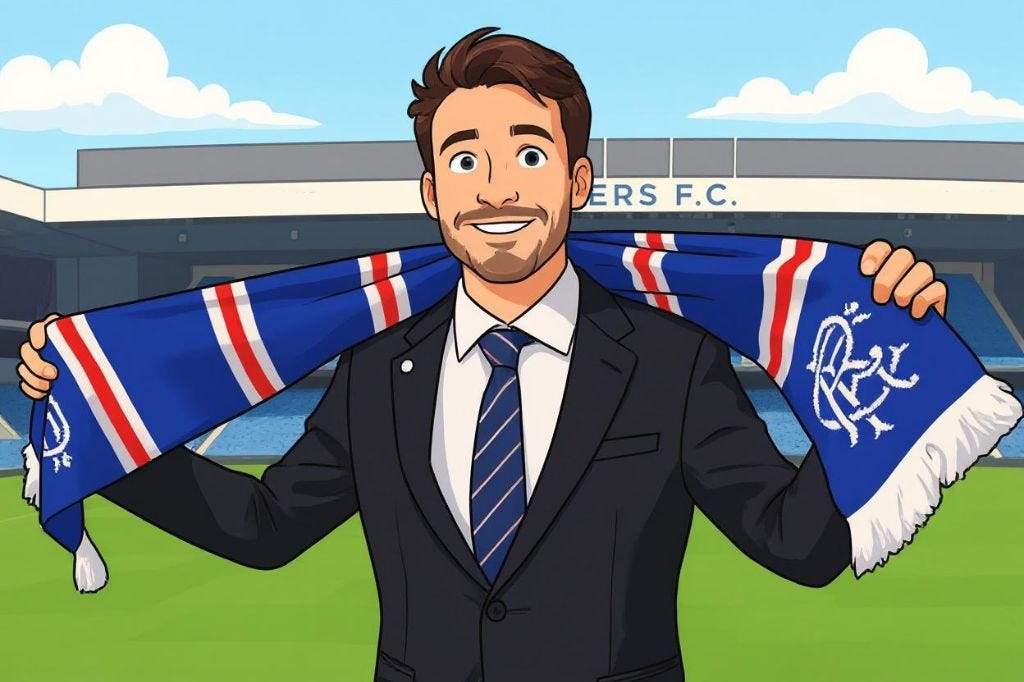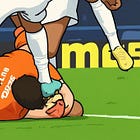False Dawns and Fanfares: The Rangers Managerial Soap Opera
Another Rangers “Messiah” arrives amid hyperbole, but reality bites hard with early defeats and fan frustration ready to boil over again when the inevitable happens.
Chris Jack’s Rangers coverage – and this latest managerial hagiography – is a textbook example of the Scottish sports media’s fixation on propping up every new Ibrox appointment with bombastic hyperbole, manufactured optimism, and a wilful disregard for the reality staring everyone in the face. Jack’s article is little more than a fanfare for another soon-to-be-ex manager, drenched in sycophantic praise and loaded with absurd ‘turning point’ rhetoric that’s been reheated for every supposed saviour who crosses the Marble Staircase at Edmiston Drive.
The Cycle of False Dawns
Every few years, the same names appear in these Rangers-minded puff pieces - Clement, Beale, Warburton, Caixinha, van Bronckhorst, Russell Martin, now Danny Rohl - with Jack and his ilk rolling out the red-carpet metaphor, the promises of “bringing back the good old days”, and the “immediate connection with the fans”, as if all that is needed to resurrect Rangers’ fortunes is the right handshake and a German accent. Never mind the fact that Rohl’s Rangers have already lost his three biggest matches: thumped 3-0 by Brann, beaten 2-0 by Roma and dumped 3-1 by Celtic in a League Cup semi-final marred by several controversial decisions that went their way and one that didn’t, hilariously, the article only references in passing when describing the “strength of feeling” among the support.
Jack’s approach is so formulaic it strains credulity. The new manager walks into Ibrox, shakes hands with the media, learns the names of the cleaning staff, and instantly becomes the man to “build something special”, despite inheriting a squad no stronger than the ones Martin and Beale failed to inspire. This predictable “messiah narrative” is rolled out not just by Jack, but across the Scottish press, as if Rangers are forever on the cusp of an epochal revival that is always about to begin, never actually arriving.
Fan Culture as Distraction
A Ranger’s manager being showered with chants and affection is not evidence of progress. It’s evidence of a fanbase desperate for any glimmer of hope - one that has spent 13 years chasing the ghost of a bygone era propped up by tax-dodging and under-the-table payments, practices that are (at least for now) off the table for Rangers 2012. The “Rohl Roar”, like Clement’s “synergy” or van Bronckhorst’s “bond with the crowd”, is blasted as if it represents a fundamental change, when in reality it’s another fleeting media construct, used as a shield to deflect from grim results and the mounting pressure already swirling around this latest appointment.
Jack is quick to praise Rohl’s “warmth”, his “affinity with supporters”, and his respectful gestures - smiles, handshakes, autographs - painting a picture of community, harmony, and momentum. But strip away the gushing tone and what’s left? Three wins, three defeats. A season now on a knife edge with the hardest league fixtures at the end of December and the New Year. Jack’s focus on Rohl’s relationship-building is less about football and more about insulating the manager (and, by proxy, the board) from criticism when results inevitably dip.
Selective Memory and Silencing Doubters
Remarkably, Jack’s retrospective on the semi-final loss to Celtic avoids scrutinising key moments [including the Trusty Butland incident surprisingly] when Rangers received multiple contentious decisions: a “dodgy” penalty for Ralston’s supposed handball, Hatate denied a clear penalty, and suspicious lines denying Celtic a valid opener. These talking points - major discussion among the Celtic fan base - are glossed over, ignored in favour of singing Rohl’s praises for consoling fans and answering questions from disgruntled supporters. The narrative is expertly steered away from objective analysis of the football and the officiating, towards emotional management and PR wins.
It’s almost parody: every postmortem of a Rangers defeat can be rebooted into character assessment, relationship building, and an “immediate impression” made on a fanbase who Jack claims “had to be won over”, despite years of evidence suggesting that fans demand only one thing - results against Celtic and silverware, not handshakes and photo ops.
Upcoming Fixtures: Media Build-up vs Reality
The next fixture list will provide Rohl with a run of “winnable games” against Livingston (home), then Braga (away, a tougher European test), Falkirk and Dundee United (with Braga highlighted as the sterner challenge), followed by trips to Kilmarnock, Ferencvaros, then league ties against Motherwell, St. Mirren, Hibs, and Hearts. Jack’s tone implies that if things go well, the “Rohl Roar” might be reverberating all the way to the New Year derby with Celtic; that the idyll of a resurgent Ibrox is just over the horizon. Seasoned observers - see only the anxious build-up for the inevitable crash when the ‘messiah’ faces his biggest tests, just as every other predecessor did.
Currently, Rangers sit fourth, five points adrift of Celtic in second, and twelve points behind Hearts (with a game in hand). The league table is laid out, the festive schedule dissected, but the real marker is flagged: their performances against Hibs, Hearts, and Celtic at year’s end and into the new year. Jack frames these fixtures as potentially redemptive, or, more likely, damning - the moment when Rohl will be exposed either as another charlatan heralded as a messiah or, in vanishingly rare cases, someone capable of mixing it with the real contenders.
The Managerial Revolving Door
From the article, Rohl’s tenure already echoes the pattern of those before him. Clement arrived “with synergy” only to depart with a whimper. Beale brought “fresh ideas” and “passionate speeches” before being hounded out. Warburton, Caixinha, van Bronckhorst, Russell Martin - each championed by the likes of Chris Jack, only for the angry rabid hun mob to bay for blood when improvement never materialises, and the squad remains miles off the standard set by Celtic.
Jack and his colleagues in the sports desk never address the underlying structural issues within the club. Instead, each new manager gets a personality profile, anecdotal evidence of bonding with the board and staff, and sweeping declarations about “togetherness”, “new beginnings”, “going in one direction”. It’s as if they’re contractually obliged to invent a narrative of impending greatness regardless of prior failures or the reality of results.
The Parody of Scottish Media Coverage
For many fans, these articles are comedy gold. The details of the “managerial affinity” and “emotional connection” at Rangers offer a checklist for how to avoid analysing the football. Jack can compose reams of copy about Rohl’s handshakes and his familiarity with the Glasgow dialect, but pays scant attention to tactical shortcomings, failed recruitment drives, and the continued inability to challenge Celtic on the pitch or in Europe. Media lickspittles like Jack are not just chroniclers of the old establishment, but active participants in maintaining the illusion that every managerial change signals a fresh start rather than a predictable repeat of recent history. I’m surprised he hasn’t peddled further superlatives about Rohl wearing a staunch suit on the touchline.
Meanwhile, we can all see through the charade unlike the gullibillies. The language used - “warm, respectful”, “no airs or graces”, “will to win”, “classy rather than cynical” - is all empty packaging, wrapping up another poor run of form with platitudes rather than substance. Results are consistently poor against the strongest opposition; the crowd is appeased with soundbites and PR moves; underperformance is spun as “work in progress” or “baby steps” towards an ever-elusive breakthrough.
What Comes Next?
Should Rangers scrape past their next “easy” fixtures, Jack will double down on the narrative: Rohl is a unifier, a motivator, an architect of renewed hope. Any slip - and with the schedule ahead, it is almost nailed-on - will see the writer’s tone shift: suddenly it’s “early days”, “adversity to overcome”, “still building”, while fans on social media turn on the manager as quickly as they once welcomed him. The regression to the mean is inevitable. We are all well-versed in this annual pantomime, and will watch with schadenfreude as Rohl - just like Clement, Beale, Warburton, Caixinha, van Bronckhorst, Russell Martin - becomes the latest to test the patience of the rabid hun mob, with Jack soon penning a requiem for the hope he spent months inflating.
Media Narrative vs Football Reality
Scottish football would be better served if the media properly analysed tactics, squad building, critiqued board decisions, and dissected the actual football played. Instead, Chris Jack’s coverage like many others in the Scottish mainstream media illustrates the sport’s ongoing struggle with old habits - a sports desk so wedded to the Ibrox revival story that it cannot accept the evidence of its eyes. Maybe that’s why Jack hasn’t progressed further than being the resident Rangers writer at the Herald Group for the past decade. This is nothing more than another parody: another manager, another cycle, another inevitable disappointment. The “Rohl Roar” will soon be drowned out - once again - by the chorus of boos at half time and full time - before calling for the latest “messiah” to get tae fuck.





We might slag Danny Rohl, but he appears to have steadied the ship at Ibrox, and brought them much needed stability.
He is better qualified than Brother Wilfrid who is being tipped for the job at Paradise.
well said! Is it not incredible the way the press deal with new rangers managers as u have mentioned,Celtic managers? Wim who,! Dr who? And not good enough etc. etc, Not to mention the great Fergus McCann being likened to Saddam Huisain!